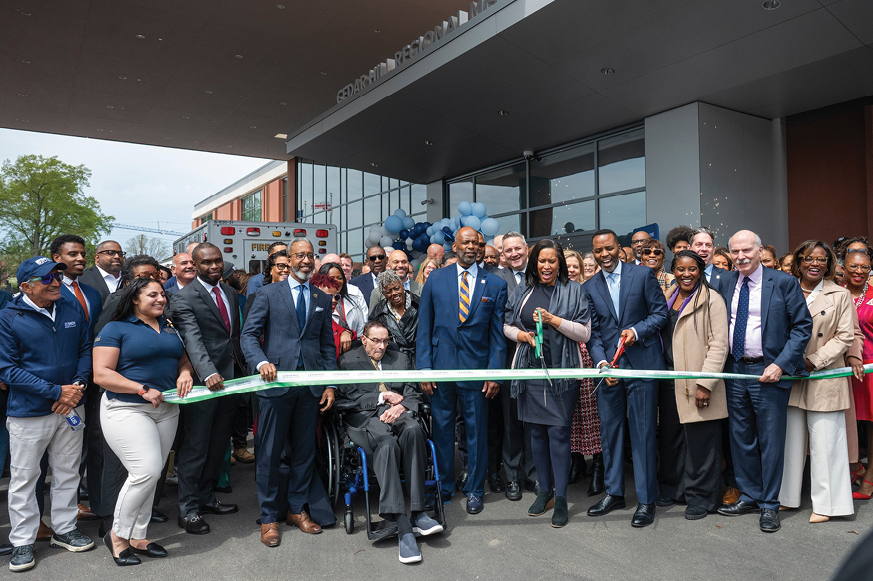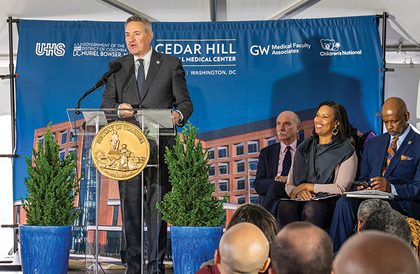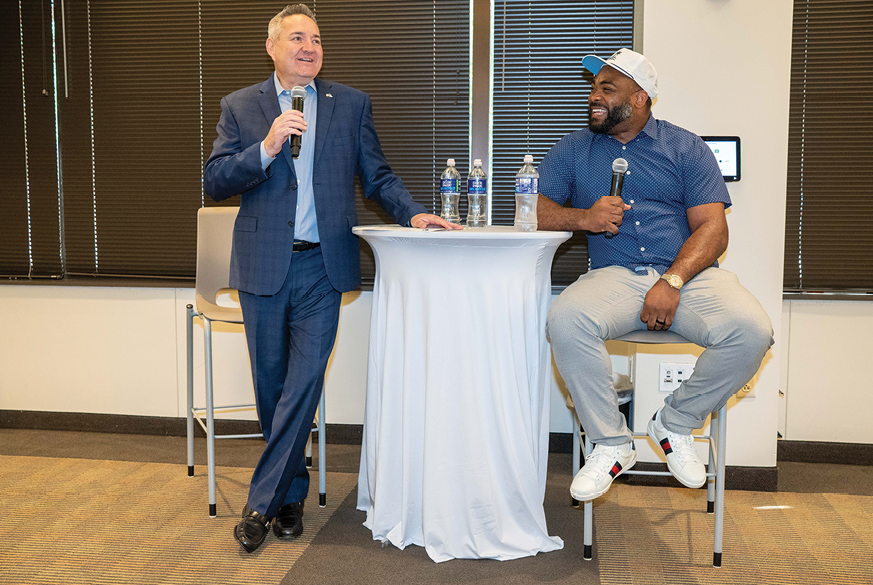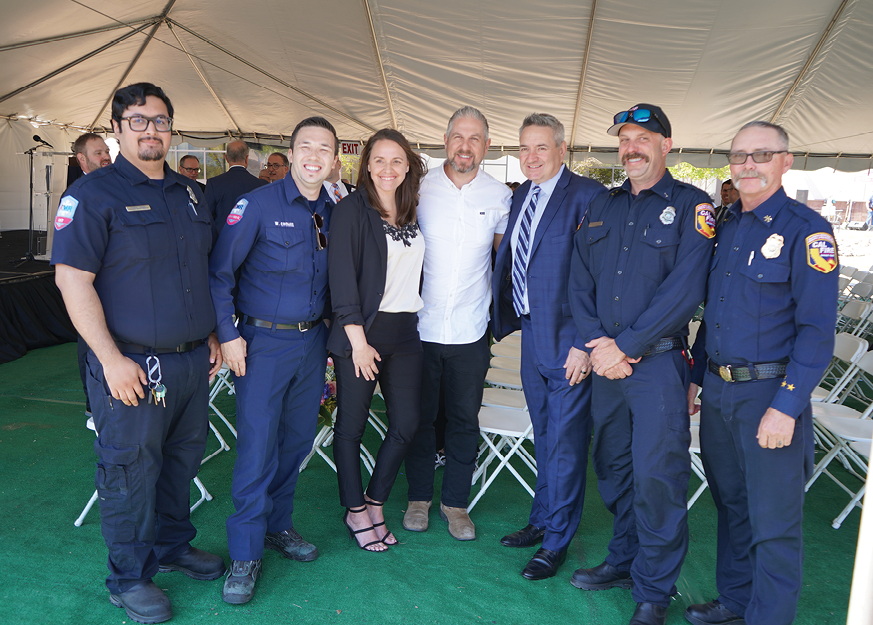- Home
- Media Kit
- MediaJet
- Current Issue
- Past Issues
- Ad Specs-Submission
- Reprints (PDF)
- Photo Specifications (PDF)
- Contact Us
- PRIVACY POLICY
- TERMS OF USE
![]()
ONLINE
![]()
ONLINE

Creating The Future
Of Healthcare
Editors’ Note
Marc Miller is President and Chief Executive Officer of Universal Health Services. He was named CEO in January 2021 and has served as President since 2009. He is a member of the UHS Board of Directors, serving on the Executive Committee and the Finance Committee. Miller began his career at UHS in 1995 and over the years has held various positions of increasing responsibility at hospitals and at the corporate office. Prior to assuming executive leadership roles at the company’s corporate headquarters in King of Prussia, Pennsylvania, Miller served in various operating roles at several UHS Acute Care Hospitals. Among his regional and divisional management roles, he served as Group Director responsible for the company’s acute care operations in Pennsylvania, South Carolina, and Florida; Eastern Region Vice President of the Acute Care Division; Senior Vice President and Co-head of the UHS Acute Care Division; and President of the Acute Care Division. Miller is also a member of the Board of Directors of Universal Health Realty Income Trust, a real estate investment trust that has investments in 76 properties located in 21 states. In 2025, Miller was selected to serve as Chair of the Federation of American Hospitals (FAH). Additionally, he has served as a member of the Board of Directors of Premier since 2015. Miller has been named twice to the annual Modern Healthcare Most Influential People in Healthcare list, most recently ranking at #49. He is frequently featured as a thought leader and provides industry perspective for national publications. Miller holds an MBA degree in healthcare from The Wharton School of the University of Pennsylvania and a BA degree in political science from the University of Vermont.
Company Brief
One of the nation’s largest and most respected providers of hospital and healthcare services, Universal Health Services, Inc. (uhs.com) has grown into a Fortune 300 corporation with annual revenues during 2024 of approximately $15.8 billion. In 2025, UHS was again recognized as one of the World’s Most Admired Companies by Fortune; ranked #271 on the Fortune 500; and ranked #355 among U.S. companies on the Forbes Global 2000 World’s Largest Public Companies. Headquartered in King of Prussia, Pennsylvania, UHS has approximately 99,000 employees and through its subsidiaries operates 29 inpatient acute care hospitals, 331 inpatient behavioral health facilities, 60 outpatient and other facilities, an insurance offering, a physician network, and various related services located in 39 U.S. states, Washington, DC, Puerto Rico, and the United Kingdom. It acts as the advisor to Universal Health Realty Income Trust, a real estate investment trust.

Marc Miller joins Mayor Muriel Bowser and the
D.C. City Council to cut the ribbon on
Cedar Hill Regional Medical Center GW Health,
the first new hospital to open in the region
in over 25 years (above and right)

How do you define Universal Health Services’ mission?
The UHS Mission states our purpose – namely, that we provide superior quality healthcare services that patients recommend to their family and friends; physicians prefer for their patients; purchasers select for their clients; employees are proud of; and investors seek for long-term returns. The UHS Mission, penned upon the company’s founding in 1979, signifies UHS’ long-standing commitment. It has been consistently praised over the years by industry experts for being authentic and for identifying value offered to all key stakeholders.
As a company, we invest significant capital in new facility construction, expansions, renovations and strategic partnerships, all of which position us for future growth. Most recently, we opened the new West Henderson Hospital in Southern Nevada; the public-private partnership Cedar Hill Regional Medical Center GW Health in D.C.; and the joint-venture Southridge Behavioral Hospital in Western Michigan. We are currently operating 34 freestanding emergency departments (FEDs). We recently expanded and relaunched Foundations Recovery Network in the substance use disorder space; launched Foundations Health for medication-assisted therapy services; and are expanding our national network of outpatient behavioral health services.

Super Bowl champion, retired Philadelphia Eagles
defensive end Brandon Graham and Marc Miller host
a town hall for employees at UHS’ Corporate headquarters
located in King of Prussia, Pennsylvania
How critical is innovation to UHS’ growth and industry leadership?
Innovation is a key aspect of everything we do. Our core strategy includes building or acquiring high-quality facilities in rapidly growing markets and investing in our people, as well as giving them what they need to be successful. We innovate in a variety of ways which enables us to better compete in the market and often times lead the market as a top healthcare provider. Our dedication to innovation is key to ensuring our facilities thrive.
What are your views on the role that AI will play in enhancing patient care?
Overall, I am enthusiastic yet cautious about the role AI plays in patient care. Our commitment to technology advancements includes UHS’ investment in General Catalyst, a leading venture capital firm ushering in a new era of patient care through health assurance investments and collaboration. We recently announced that we are working with Hippocratic AI and have released an AI agent to help clinicians make follow-up phone calls to patients, post-discharge. Generative AI agents support clinicians in monitoring patients’ well-being after they leave the hospital by quickly detecting changes in their conditions and fielding questions, which is just one example of utilizing AI to bring positive outcomes to patients. For UHS, we will focus use of AI largely in non-patient facing areas and back-end operational and administrative functional areas. As things evolve there will be many more opportunities to expand outreach with AI in a variety of appropriate areas.

Marc Miller joins former patient Steffani Natter,
her family and the medical team from Southwest
Healthcare Temecula Valley Hospital (located
in Temecula, California) who saved her life
Where is innovation occurring inside UHS?
In addition to the AI-powered pilot currently underway, and explained above, UHS is expanding its use of Oracle Health’s Electronic Health Record (EHR) across the network, including behavioral health facilities. This creates a unified EHR encompassing both mental and physical health histories, leading to better care decisions and improved patient safety. We are currently piloting a companion app to follow the in-patient behavioral health stay experience. An example in the behavioral health space that we are testing is electronic enabled proximity rounding that uses patient wearables and staff tablets to support timely and compliant patient observation processes, improving efficiency and effectiveness of required rounds. We have several facilities that are currently testing this and so far the feedback from staff is overwhelmingly positive.
In Robotics, UHS continues to invest in da Vinci robots to support minimally invasive robotic surgery enhancing reach, stability, precision and overall patient outcomes. For example, our hospitals in South Texas recently installed the da Vinci 5 surgical robot, marking a significant advancement in their robotic surgery program. The da Vinci 5 is the latest and most advanced robotic surgical system, providing surgeons with improved visualization, dexterity and control during minimally invasive surgeries. Further, it incorporates force feedback technology, providing surgeons with a sense of touch during the procedure.
Benefits of these innovations across our facilities include better access to care for patients, increased patient engagement, improved diagnostics and efficiency.
What has made the industry so special for you?
Healthcare is personal. It is our mission, through our hospital staff and at our subsidiaries, to deliver compassionate care to individuals during some of the most challenging circumstances and vulnerable moments of their lives. It is a responsibility we take seriously. We find helping others live longer lives to be fulfilling work in many ways. I cannot think of anything more rewarding than a career in healthcare.
When you look to the future of the industry, what excites you the most, and what concerns you the most?
I am excited by the potential to positively impact lives each day, in new and evolving ways. There are always certain factors that we must overcome to make this happen, and the current business climate projects a number of areas and possible obstacles that we will have to deal with. But I am confident that our team will be successful in overcoming whatever lies in front of us and find success in many ways in the future.![]()